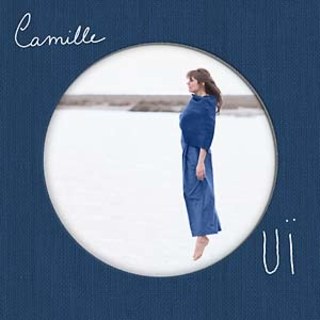The Parisian pop experimentalist Camille sounds awed by language as a brilliant, living thing on her latest album. Inspired by the psychedelia of motherhood, she doubles down on her sharp playfulness.
Camille Dalmais doesn’t so much wear her intelligence lightly as fashion it into excellent costumes. The 39-year-old Parisian graduated from the prestigious university that produced a majority of the last eight French presidents, and at least the latter four of her five albums have been both wildly experimental and genuinely entertaining. She’s played around with vocal drones and beatboxing, with a cappella singing and feral shrieks; she once challenged Mariah to a falsetto duel. On 2011’s Ilo Veyou, she invited a scammer to a banquet where his ex-lovers would dine on his “tiny, erect dart” in a “single and languorous mouthful.” (The invitation sounds more appealing in the original French.) If Dalmais has a recurring theme amid all this mischief, it’s the body. Ilo Veyou and now OUÏ were both inspired by her experiences of birth and motherhood—psychedelic, transformative states that she explores by doubling down on her sharp playfulness rather than submitting to anything as boring as maturity.
Admittedly, Ilo Veyou was fustier than her previous records, drawing on traditional medieval arrangements that may have stalled some listeners at the gate. But OUÏ—implying both yes (oui) and hearing (l’ouïe)—is more inviting, both outlandish and intimate. As with 2005’s brilliant Le Fil, which was threaded by a low vocal tone, a sub-bass heartbeat runs through every song, interwoven with deep Moog accents and minimalist drumming. Dalmais plays both lead singer and loopy backing choir, her panoply of voices leaping like water jets in some rococo fountain. Initially she intended to make a political album about the recent tragedies that have struck France, but instead, she decided to pursue something more rooted in openness and fluidity of sound and spirit. Even if you can’t understand a word of the lyrics, the idea resonates in her voice and its slippery language, which makes puns and double entendres of French’s elegant homonyms. Most importantly, the underlying concept rarely strangles the pop potential of OUÏ’s 11 songs.
There’s plenty of pure pleasure hits for non-Francophones. “Twix” pits Dalmais’ plosive skittishness against a rhythm of jumpy, sampled voices. The nervous energy mounts and explodes in a tirade of tortured vocal splatter and crude bass, recalling the manic highs of Le Fil’s “Ta Douleur.” Not that aggressive outbursts always serve Dalmais well. “Les Loups” (“The Wolves”) turns an old folk rhythm into a discordant clatter, hooked around a voice that appears to be imitating a barking didgeridoo. “Lasso” is more dynamic and better for it, and could be Dalmais’ own contribution to the folk canon with its syncopated claps, sweeping gait, and concerned voices singing in the round.
It’s a shame there’s no such thing as a subtitled listening experience because OUÏ is rich with brilliant, funny ideas about conception, nurture, and identity. Lead single “Fontaine de Lait” puns on how Dalmais’ child-bearing body transformed sperm into milk, filled with frothy, comic imagery. “And now I make/A fountain of him,” Dalmais sings (in French), “And here I am/A fountain of milk.” A flirty, wobbling woodwind sound and a soft, sandy beat map the path of these intricate biological processes, a choir of backing vocals cooing in awe. “Piscine” is just as playful and surreal, Dalmais impersonating a lonely swimming pool that longs to break free and reconnect with the ocean. The beat is surreptitious and sneaky, as if plotting its escape, and a choir calls out to the water. “Aller à la mer,” she sings—“I want to go to the sea”—or is it “aller à la mère,” mapping her path to motherhood? The potential meanings are just as fun as the sound.
Dalmais’ love of linguistic elasticity finds a bolder purpose in “Je Ne Mâche Pas Mes Mots” (“I Don’t Chew My Words”). She pairs two traditional French styles, yearning chanson and shuffling rap, bringing a sense of urgency to goofy lyrics about how good words taste in her mouth—like apple jelly, honey, artichoke, and strawberry coulis. By marrying tradition and first-generation innovation, and turning a notoriously rigid language upside down, she makes a subtle statement about free speech, and kicks back at prescribed definitions of French identity. OUÏ ends with “Langue,” and Dalmais chanting a word that could mean language or tongue, finding sing-songy sweetness in the slight tweaks of pronunciation. She sounds self-possessed, as awed by language as a brilliant, living thing as by her body’s transformative potential.
